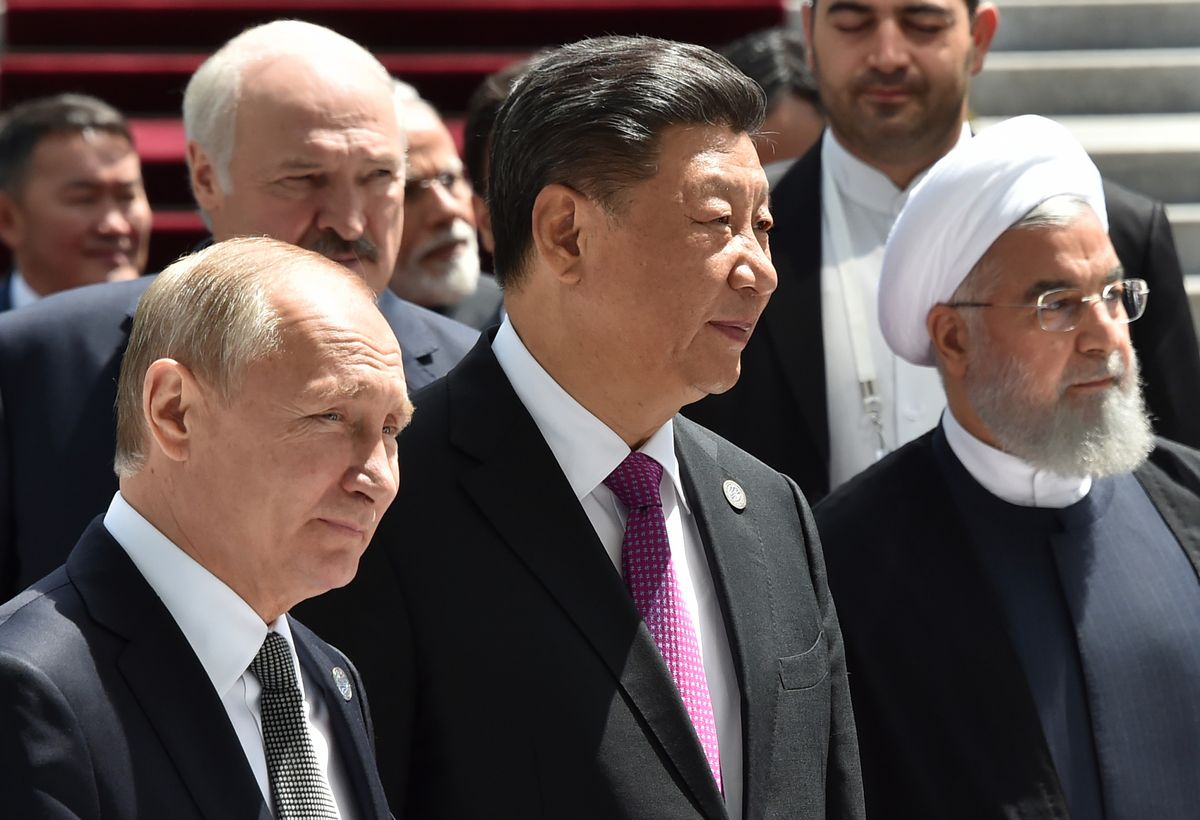US warns Russia and China against opposition of Iran arms embargo

A few minutes every morning is all you need.
Stay up to date on the world's Headlines and Human Stories. It's fun, it's factual, it's fluff-free.
On Wednesday, United States Iran envoy Brian Hook said that Russia and China would be isolated at the United Nations (UN) if they continue down the “road to dystopia” and try to block the US’ motion to indefinitely extend a weapons ban on Iran.
Under the terms of the 2015 nuclear agreement, formally known as the Joint Comprehensive Plan of Action (JCPOA), the arms embargo imposed on Iran is due to expire in October of this year. This agreement was signed by the United Nations Security Council (UNSC) and Iran to prevent Iran from developing nuclear weapons in exchange for relief from economic sanctions.
“We see a widening gap between Russia and China and the international community,” Hook said in an interview with Reuters.
“Russia and China were isolated at the IAEA last week and they will be isolated in the Security Council if they continue down this road to dystopia,” he continued, referring to a meeting with UN watchdog, the International Atomic Energy Agency (IAEA) last Friday.
On Monday, a draft resolution was introduced by the US before the UNSC, calling for the council to indefinitely extend the Iran arms embargo which has been in place since 2007.
The draft resolution comes after UN Secretary General Antonio Guterres reported that cruise missiles of “Iranian origin” were apparently found to be used in several 2019 attacks in Saudi Arabia.
Although the UN didn’t go as far as to accuse Iran of launching the attacks, Iran responded “categorically” rejecting the UN’s findings. In a statement released on Friday, the Iran Mission stated that the secretariat “lacks the capacity, expertise, and knowledge to conduct such a sophisticated and sensitive investigation.”
Earlier this month, Iran was also accused by the US and IAEA members France, Germany and the United Kingdom of hiding suspected nuclear activity. A resolution adopted by the board of governors highlighted “serious concern” over “possible undeclared nuclear material and nuclear related activities” after Iran apparently refused to allow inspectors into two nuclear facilities.
Russia and China were the only two countries who voted against this resolution, prompting Christopher Ford, a top US State Department nuclear official, to call the two nations “protector[s] and enablers” of Iranian effort to restart their nuclear program.
Since then, Iran has committed to accepting the IAEA’s legal inspections with Iranian President Hassan Rouhani expressing readiness to “maintain close cooperation with the IAEA within legal frameworks.”
Despite this, Washington has remained determined to extend the arms embargo on Iran, further pushing the draft resolution on Wednesday’s closed-door meeting with the 15-member UNSC. In order for the resolution to pass, it needs at least nine votes in favor as well as no vetoes issued by the US, UK, China, Russia or France.
“Extending the arms embargo is the right and necessary thing to do and every member of the Security Council knows this whether they say this publicly or not,” argued Hook. “The embargo has not prevented all Iranian weapons transfers, but the export and import bans have been effective at establishing clear limits on Iran’s behavior.”
The US also appears to be undeterred by Russia and China’s veto-wielding power, threatening to trigger a return of all UN sanctions on Iran if their motion is denied. This move, which cannot be vetoed, utilizes the “snapback" provision of Resolution 2231 that outlines the JCPOA which allows all listed participants to unilaterally reimpose sanctions.
In response to this threat, Russia and China have argued that the US has no right to act on this provision after their withdrawal from the nuclear agreement in 2018. However, the US defended their right to trigger the snapback because the 2015 resolution still names it as a participant.
“There is no possibility for its adoption,” said a Chinese diplomat, who spoke to Reuters on the condition of anonymity after Hook’s pitch to the council envoys.
“The US draft resolution is in essence a continuation of the US maximum pressure policy [on Iran] and it has no value or basis for discussion.”
In the backdrop of the US’ efforts, Russia and China have reportedly supplied Iran with military equipment, with sales and prospective deals being valued at billions of dollars. Furthermore, the three countries held a joint naval drill last December in the Gulf of Oman to train their forces in anti-piracy and anti-terrorism efforts.
Ahead of the Wednesday UNSC, President Rouhani gave a televised address stating that they would be open to nuclear negotiations with the US, despite their previous rejection of such talks.
“We have no problem with talks with the US, but only if Washington fulfills its obligations under the nuclear deal, [apologizes] and compensates Tehran for its withdrawal from the 2015 deal,” said Rouhani.
“But we know these calls for talks with Tehran are just words and lies,” he added.
His address prompted a response from US Secretary of State Mike Pompeo, who said on Wednesday that the US is “happy to engage in conversations with them when the time is right.”
However, in an apparent response to Iran’s compensation requests, Pompeo said that “the conditions that suggest somehow we give a bunch of money to the Iranians so they can foment terror around the world is simply ludicrous.”
Have a tip or story? Get in touch with our reporters at tips@themilsource.com




Comments ()